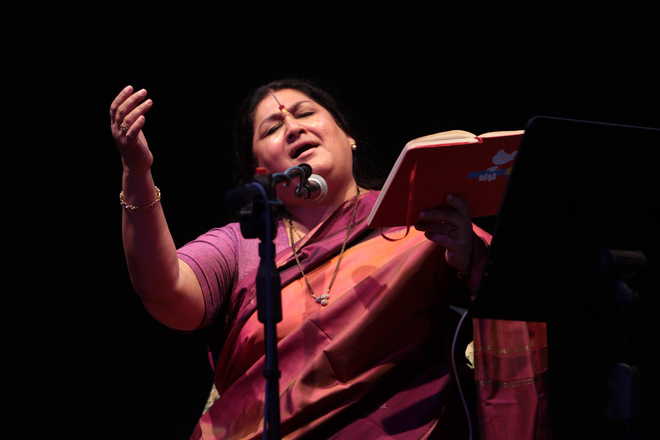
Neha Kirpal
Shubha Mudgal knows the new generation speaks a different language. She knows attending classical music concerts is a thing of the past for them. But, who said Hindustani can’t go to the youth? To reach out to them, Shubha is talking to them in their language. That of apps, streaming, etc.
The Padma Shri awardee has, along with her husband, Aneesh Pradhan, established an online distribution platform for musicians specialising in diverse forms of Indian music through the website www.UnderscoreRecords.com. Among the many projects, they have initiated in their efforts to preserve the rich musical heritage of India is www.SangeetKosh.net, an online encyclopedia of Indian music.
Shubha Mudgal talks to us, among other things, about the challenges Hindustani classical music scene is facing and its future.
You have been a connoisseur of Hindustani classical music for decades. How have you seen the landscape change over the years?
I have been a student of Hindustani classical music for over 35 years now and there have indeed been quite a few noticeable changes. On a positive note, festivals that have put in sustained efforts to promote classical music for decades witness a marked increase in audience numbers. As a result, leading festivals now attract listeners in many thousands. However, smaller music circles — that have also made an invaluable contribution — find it difficult to attract audiences and organise concerts periodically due to the lack of funds and support. Some of the bigger music festivals have also had to downsize due to the lack of adequate sponsorship.
As instruments like keyboards, guitars and drums find more takers, traditional artisans and master craftsmen, who make acoustic Indian instruments like the tanpura and the sitar, find it difficult to sustain themselves. Many of them prefer to look for other professions for their children. It will be a pity if their mastery is lost to future generations.
What, according to you, is the way to increase the reach of Hindustani classical music among today’s younger generation?
I think platforms like YouTube throw up an absolute treasure of music. But a listening guide that explains facts in simple terms is what is difficult to come by. There are various artistes and scholars who are attempting to put together music appreciation modules. However, this is not a simple task and requires some experimenting, scripting and a fair bit of research and development — all of which require support and funding. It is hard enough to find sponsors for events and performances in India. I can imagine what a Herculean task it would be to look for sponsors for music education modules.
What are the some of the newer mediums to access Hindustani classical music?
From Spotify (currently not available in India) to Gaana and YouTube, every platform is available for music lovers to explore. The problem lies in making the right discovery. If you don’t know which artiste, raag, style or instrument you want to hear, you could just wade around forever more and not find the music that you might enjoy.
Would a dedicated TV, radio or YouTube channel be commercially viable? For e.g., is World Space Radio’s Gandharva channel on classical music (closed now) still viable?
No, I think it has already been proved in case of the Gandharva channel, InSync, etc. that listeners of Hindustani classical music don’t want to buy subscriptions. Further, the programming needs to be innovative and technically on par with other channels. Settling for mediocre or low quality, badly produced content simply to fulfill the 24-hour mandate is not going to help Hindustani classical music, its exponents or its listeners. Therefore, it is best that no attempt be made to start dedicated television or radio channels till these issues are worked out in the greatest detail.
Is there scope for instituting annual awards for Hindustani classical music/artistes?
There are enough awards, and enough dirt and corruption around the existing awards for me to say categorically that more awards are only going to create a bigger scramble and tussle for them.
What was your experience in composing music for the recent plays Ladies Sangeet and Bandish 20-20000Hz?
Both plays revolve around forms and styles of music that I have been studying for decades. Both are directed by Purva Naresh who is herself trained in kathak, pakhawaj and music. Therefore, the experience was pleasant, enriching and satisfying.
Do you see yourself composing for more plays or films?
Well, I am no specialist in composing music for either films or theatre. But when the subject or script demands the involvement of a trained Hindustani musician, I am happy to be involved and collaborate, if my schedule permits me to do so.



























